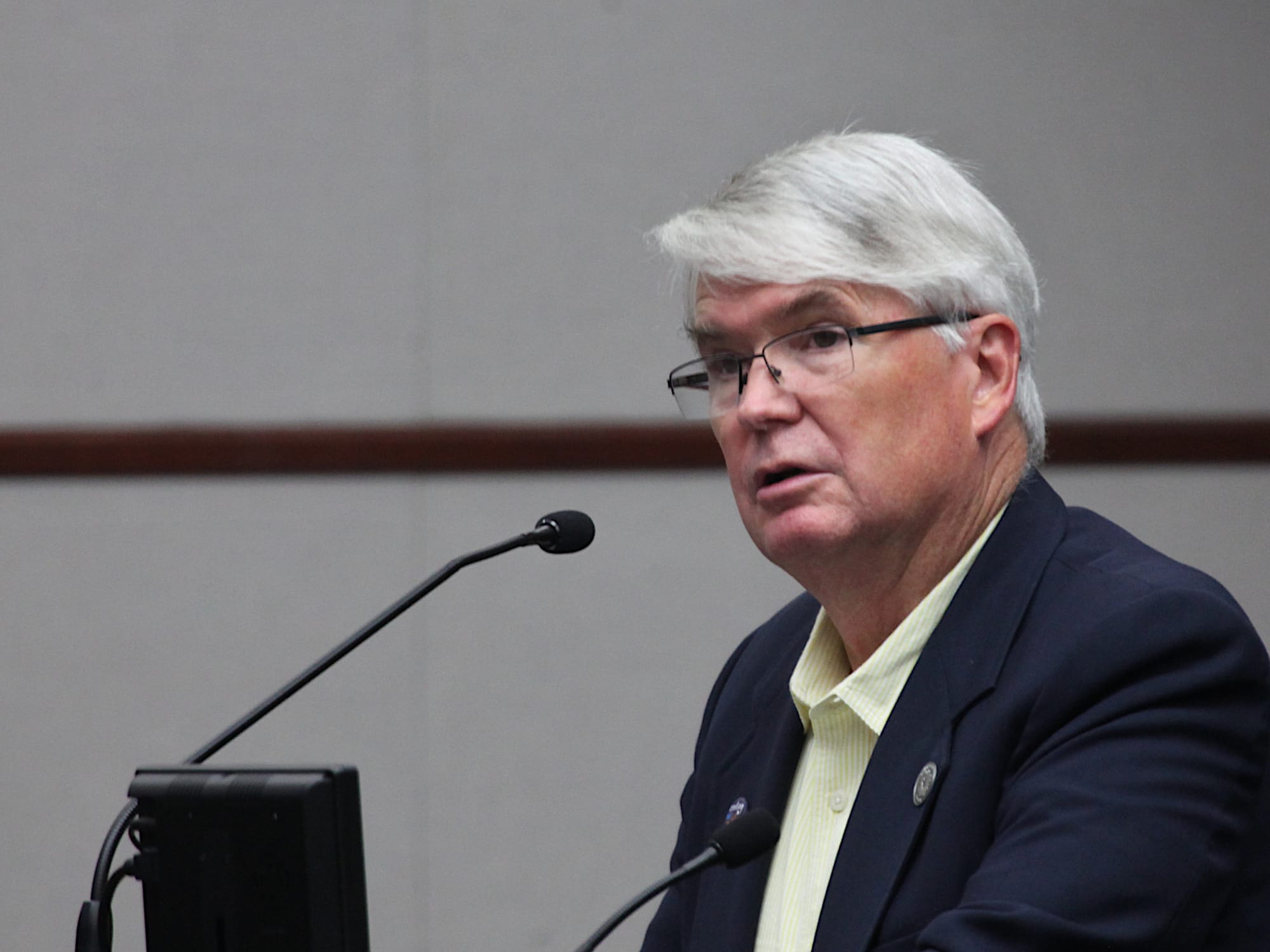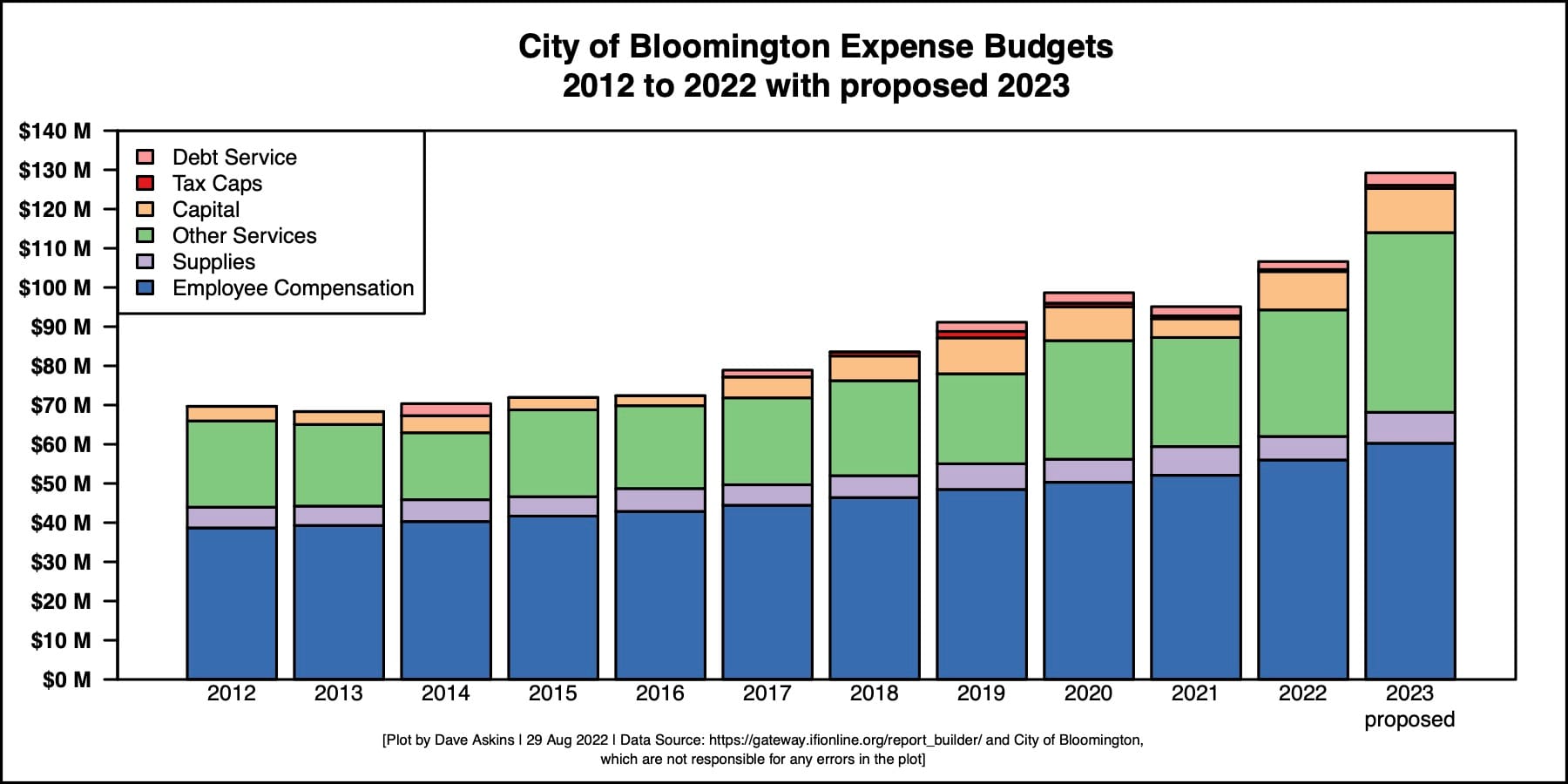$129M in 2023: Bloomington mayor asks city council to approve 21% bigger budget for next year




The 2023 budget that has been proposed by Bloomington mayor John Hamilton comes in at $129.2 million, which is about 21 percent more than last year.
That’s the figure in city controller Jeff Underwood’s memo, which was released on Monday at 2 p.m. A news release came a few minutes later.
Hamilton delivered the proposal to the city council on Monday evening.
The budget reflects a 5-percent pay increase for non-union workers, plus a $250 quarterly bonus, for a total of $1,000 in bonuses.
Hamilton’s presentation was followed by a financial overview from city controller Jeff Underwood and an overview of compensation by human resources director Caroline Shaw.
After that, the council received departmental budget briefings from several departments: human resources; clerk’s office; legal department; information and technology services; city council; controller; and office of the mayor.
The departmental budget breakdowns were released last Friday. The departmental budget presentations to the council will continue over the next three nights, all starting at 6 p.m. The B Square will report reaction from councilmembers separately.
The $129 million reflects all of the city’s departments, but does not include city of Bloomington utilities, Bloomington Transit, or the Bloomington Housing Authority. Adding in the budgets for those three entities brings the total to about $229 million.
Changes residents will notice
Part of the budget proposal includes reductions in some city services, increased costs to residents, or changes to current practice.
Trash collection fees will increase—by how much is not yet clear. The increased fees are supposed to put the city on a three-year path to removal of general fund support of trash collection service for single-family houses and buildings with up to four units.
This fall would be the last year that residents can rake their leaves to the street and have the city pick them up at no cost through its curbside vacuum services. That service would not be provided, starting in 2023.
Responsibility for street sweeping would be transferred from the public works street division to city of Bloomington utilities (CBU), as a part of CBU’s stormwater management program.
Parking meters in Bloomington will transition almost exclusively to electronic payment systems, eliminating the use of coins.
There could be a few less places to park. Hamilton told the council on Monday that next year the city plans to convert a parcel of city-owned property—likely a surface parking lot—into affordable housing.
Hamilton also told the council that the city will be reviewing its 911 protocols and deployments to determine how best to deploy sworn public safety resources. The idea is to identify situations where an armed response might not be a preferred response. To that end, the proposed 2023 budget would add a social worker to the dispatch center.
As part of the $129 million total, the 2023 budget calls for adding a total of 17.5 net new positions. Adding in six positions for utilities brings the total to 24.
Revenue
The additional expenditures are fueled by a 5-percent increase in property tax revenues. Most of the extra money is coming from the increase to the local income tax (LIT), which was approved by the city council earlier this year. That LIT rate increase amounts to $16 million in extra revenue.
The amount of revenue generated by the previously existing LIT rate will also increase compared to 2022—from $12.5 million to $14.3 million, which is $1.8 million more.
The increased budget figure also relies on spending $4 million in food and beverage tax revenues in 2023 to support the expansion of the Monroe County convention center. The budget also taps the housing development fund for $2 million.
Compensation
Decisions about wages and salaries this year come in the context of 7.5-percent inflation, measured between December 2020 and December 2021, according to the US Bureau of Labor Statistics midwest urban CPI.
According to HR director Caroline Shaw’s memo, non-union city employees, who don’t have collectively bargained contracts, will get a 5-percent cost-of-living increase for 2023. Regular employees, with some exceptions in the police department and the dispatch center, will receive quarterly bonuses of $250 for a total of $1,000 in bonus pay.
For union employees, the increases for 2023 have been set under contract, except for members of AFSCME, who are currently supposed to be in negotiations with the administration for their new agreement, which will run from 2023 through 2026.
However, the administration has paused those meetings with AFSCME now, as the administration works through the departmental budget presentations. The pause in negotiations was a point of complaint from AFSCME members who attended a city council meeting two weeks ago, to air their concerns about the administration’s approach to the negotiations.
From their point of view, the administration wants to set its budget and then negotiate based on the amount the administration has already settled on. On Monday, responding to a councilmember question, city controller Jeff Underwood said that the proposed 2023 budget does not reflect any increase in base salary for AFSCME workers, but does include a quarterly $250 bonus on par with other city workers.
At an early August city council meeting, AFSCME leadership, supported by a couple dozen members who attended, called for pay increases in the new contract that would make compensation for Bloomington’s AFSCME workers competitive.
Bloomington police officers will be receiving around a 13-percent increase under next year’s contract, which has already been ratified by the city council. Under their union contract, Bloomington firefighters will be receiving a 2-percent raise.
According Shaw’s memo, temporary workers will receive at least the living wage, which is defined as $15.29 per hour in 2023. When it was first enacted in 2005, Bloomington’s living wage ordinance set the living wage at $10 per hour with an annual increase tied to the CPI each year.
City employees are supposed to see a reduction in healthcare costs when the city establishes an employee health clinic, which is supposed to be set up by the end of 2023.
According to Shaw’s memo, Bloomington will also reimburse up to $2,500 in travel and lodging expenses for employees to travel out of state for an abortion. That comes after Indiana’s state legislature enacted SB1, which prohibits most abortions. Indiana governor Eric Holcomb signed the bill into law in early August.
2023 Bloomington Budget: Proposed new positions
| Position | FTE | Department |
| Part-time Laborer – Environmental | 0.75 | Utilities – Environmental |
| MEO – Environmental | 1 | Utilities – Environmental |
| Water Specialist – Environmental | 0.75 | Utilities – Environmental |
| Assistant Superintendent | 1 | Utilities- Blucher Poole Plant |
| Assistant Superintendent | 1 | Utilities- Dillman Plant |
| Field Engineering Technician | 1 | Utilities-T&D |
| Assistant Superintendent | 1 | Utilities-Water Plant |
| Digital Equity Specialist and Navigator | 0.5 | ITS |
| Social Worker | 1 | Dispatch |
| Community Care Coordinators | 1 | Fire |
| Community Care Coordinators | 1 | Fire |
| Deputy Fire Marshall | 1 | Fire |
| Program Manager – Affordable Housing | 1 | HAND |
| Director of Compensation and Benefits | 1 | Human Resources |
| Talent Acquisition Specialist | 1 | Human Resources |
| Community Care Specialist | 1 | Police |
| Community Care Specialist | 1 | Police |
| Community Care Specialist | 1 | Police |
| Engineering Field Specialist | 1 | Engineering |
| Admin Assistant to Talent Coordinator | 0.4 | Human Resources |
| Zoning Planner | 0.5 | P&T |
| CSR to Admin Assistant | 0.25 | Parks |
| Sports Specialist | 1 | Parks |
| Foreperson | 1 | Parks |
| Laborer – Sanitation | 1 | Parks |
| Laborer – Urban Greenspace – Land | 1 | Parks |
| Laborer – Urban Greenspace – Veg Management | 1 | Parks |
| Parks – Temporary | -3 | Parks |
| Fleet Mechanic | 1 | Public Works – Fleet |
| Special Projects Coordinator | 1 | CFRD |
| Grant Research and Sourcing Manager | 1 | Controller |
| TOTAL | 24.15 | CITYWIDE |




Comments ()